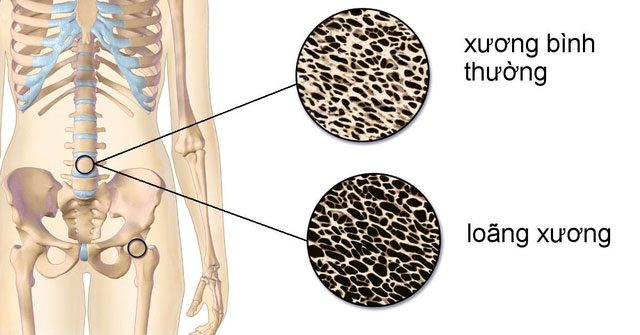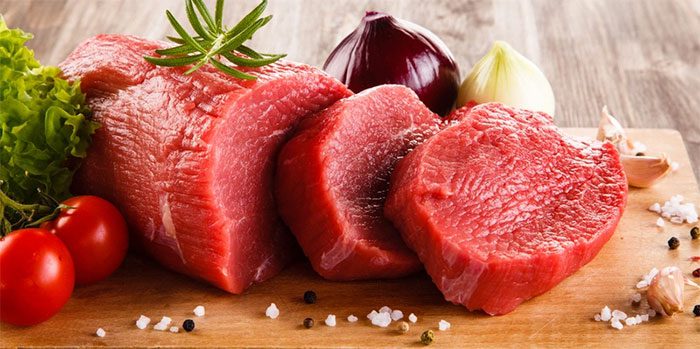As the body ages and its functions decline, it is important to pay attention to diet to avoid harming health.
Over time, many functions of the human body begin to decline. The amount of calcium in the body gradually decreases as age increases. Particularly during middle age, calcium in the bones is lost rapidly, making bones brittle and leading to various symptoms. Therefore, middle-aged and elderly individuals should engage in appropriate exercise to reduce the risk of osteoporosis, while also consuming more calcium-rich foods to supplement calcium intake.
According to recommendations from the Ministry of Health in 2012, the calcium nutritional requirements for Vietnamese people are categorized by age group as follows:
- Infants aged 0 – 6 months: need 300mg of calcium per day.
- Infants aged 6 – 11 months: need 400mg of calcium per day.
- Children aged 1 – 3 years: need 500mg of calcium per day.
- Children aged 4 – 6 years: need 600mg of calcium per day.
- Children aged 7 – 9 years: need 700mg of calcium per day.
- Individuals aged 10 – 18 years: need about 1000mg of calcium per day.
- Individuals aged 18 – 50 years: need about 1000mg of calcium per day.
- Pregnant women, elderly individuals: need to supplement with higher amounts of calcium, around 1200mg – 1500mg per day.
Thus, adults require about 1000mg of calcium per day for strong joints and bones, to slow down the degeneration process and avoid pain during movement. However, calcium supplementation cannot be done arbitrarily without scientific basis.

Lifestyle and nutrition directly affect bone health.
Even in our daily diet, there are many types of foods that can become “thieves of calcium.” If you don’t want to “be weak before getting old,” and suffer from fractures from a minor fall, everyone should be cautious and limit the consumption of these four types of foods!
The First Type: Carbonated Beverages
Carbonated beverages are popular today. When consumed in large quantities, the carbonic acid in these drinks combines with calcium to form calcium carbonate, which is ultimately expelled from the body through urine. This condition leads to calcium loss in the human body, increasing the risk of back pain, leg pain, and hypocalcemia if prolonged… Especially in middle-aged and elderly individuals, whose bodily functions are already declining, the impact of carbonated drinks can worsen their condition.
The Second Type: Sugary Foods
Excessive sugar intake not only raises blood sugar levels but also produces acidic substances. These acidic substances neutralize the calcium present in the body and severely affect the absorption of new calcium.
Sweets also deplete vitamins and minerals from the body during digestion, such as vitamin B – an important nutrient involved in glucose metabolism, and calcium essential for healthy teeth and bones.

A high-sugar diet negatively affects bone health.
The Third Type: Salty Foods
Human life cannot be separated from salt, but consuming excessive salt leads to many unwanted health consequences, especially negatively affecting bones. Salt causes calcium loss from bones, while calcium is extremely important for protecting bone health and strength.
Moreover, when we eat too much salt, the kidneys have to work harder to eliminate the salt from the body through urine. You will urinate more often, resulting in a higher calcium loss through urine.
The Fourth Type: Fatty Foods
Research shows that a high intake of saturated fats in the diet can be a risk factor for osteoporosis. Red meats such as beef, buffalo meat, lamb, and horse meat are rich in saturated fats; increasing the consumption of these fats may be associated with a higher risk of fractures due to osteoporosis. Red meats like beef, buffalo meat, lamb, and horse meat are rich in saturated fats, which may be linked to a higher risk of fractures due to osteoporosis.
Red meats like beef, buffalo meat, lamb, and horse meat are rich in saturated fats, which may be linked to a higher risk of fractures due to osteoporosis.
In addition, fried foods with high oil content can lead to increased blood fat, obesity, and are not beneficial for the body’s calcium and mineral absorption processes, depleting the nutrients in bones and increasing the risk of osteoporosis.
A high level of saturated fats, mainly found in processed meat products, hinders calcium absorption in the intestines. It also increases the risk of obesity, which can negatively affect bone health, increasing pressure on the skeletal system and reducing bone quality.
Furthermore, the risk of osteoporosis rises among the elderly, those with sedentary lifestyles, smokers, heavy alcohol consumers, and especially those with diets that do not provide enough calcium and vitamin D… Therefore, it is essential to limit bad habits and gradually adjust one’s lifestyle to be healthier and more scientific.


















































